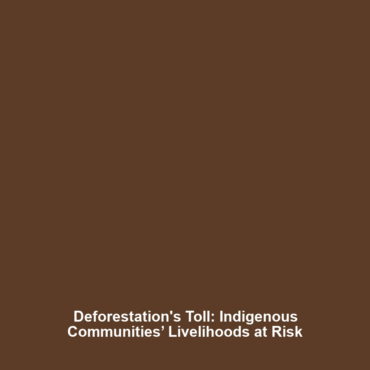Impacts on Indigenous Communities: Loss of Livelihoods and Cultural Heritage
Introduction
The impacts of deforestation and biodiversity loss are profoundly felt by indigenous communities. As forests are cleared for agriculture, logging, and infrastructure, the livelihoods of these communities are threatened, resulting in significant cultural heritage losses. Understanding these impacts is crucial, as they highlight the interconnectedness of environmental health and social well-being. This article examines the significant implications of deforestation on indigenous peoples, their traditional practices, and the urgency of their cultural preservation. In discussing the loss of livelihoods and cultural heritage, we unveil the broader socio-ecological consequences within the context of biodiversity loss.
Key Concepts
The following key concepts are essential in comprehending the impacts of deforestation on indigenous communities:
1. Livelihood Dependency on Ecosystem Services
Indigenous communities often rely on forests for their livelihoods, sourcing food, medicine, and materials directly from their environment. This dependency illustrates the intricate relationship between indigenous cultures and biodiversity.
2. Cultural Heritage and Traditional Knowledge
Cultural heritage, encompassing languages, cultural practices, and traditional ecological knowledge, is deeply intertwined with indigenous populations’ relationship to their land. Deforestation erodes these practices, leading to a loss of identity.
3. Rights and Recognition
Many indigenous groups face challenges in asserting their land rights, which exacerbates the impacts of deforestation. Recognizing these rights is pivotal for sustainable forest management and community resilience.
Applications and Real-World Uses
Understanding the impacts on indigenous communities helps to inform various applications, particularly in conservation efforts:
- How impacts on indigenous communities are used in conservation strategies: Collaborative approaches that integrate traditional ecological knowledge can enhance biodiversity conservation efforts.
- Applications in sustainable development: Empowering indigenous communities can lead to successful sustainable land management practices, balancing economic needs with environmental protection.
Current Challenges
Despite the critical importance of studying the impacts on indigenous communities, several challenges persist:
- Limited access to comprehensive data and research focusing on indigenous perspectives.
- Political and legal barriers that hinder indigenous rights recognition.
- Issues in integrating traditional ecological knowledge into formal environmental policies.
- Challenges of climate change exacerbating the effects of deforestation.
Future Research and Innovations
Future research is crucial in addressing the impacts on indigenous communities and developing innovative solutions:
- Exploration of contemporary technologies that help document and preserve traditional knowledge.
- Research on community-led conservation programs as a sustainable alternative to deforestation.
- Innovations in policies that ensure better representation and rights for indigenous populations in environmental advocacy.
Conclusion
The loss of livelihoods and cultural heritage among indigenous communities represents a significant facet of the broader issues associated with deforestation and biodiversity loss. As we deepen our understanding of these impacts, it is essential to advocate for the recognition of indigenous rights and to implement strategies that nurture both cultural and ecological integrity. Engaging with these communities and incorporating their knowledge into environmental practices can pave the way for sustainable futures.
For further exploration of related topics, visit our pages on sustainable forest management and the importance of biodiversity conservation.
